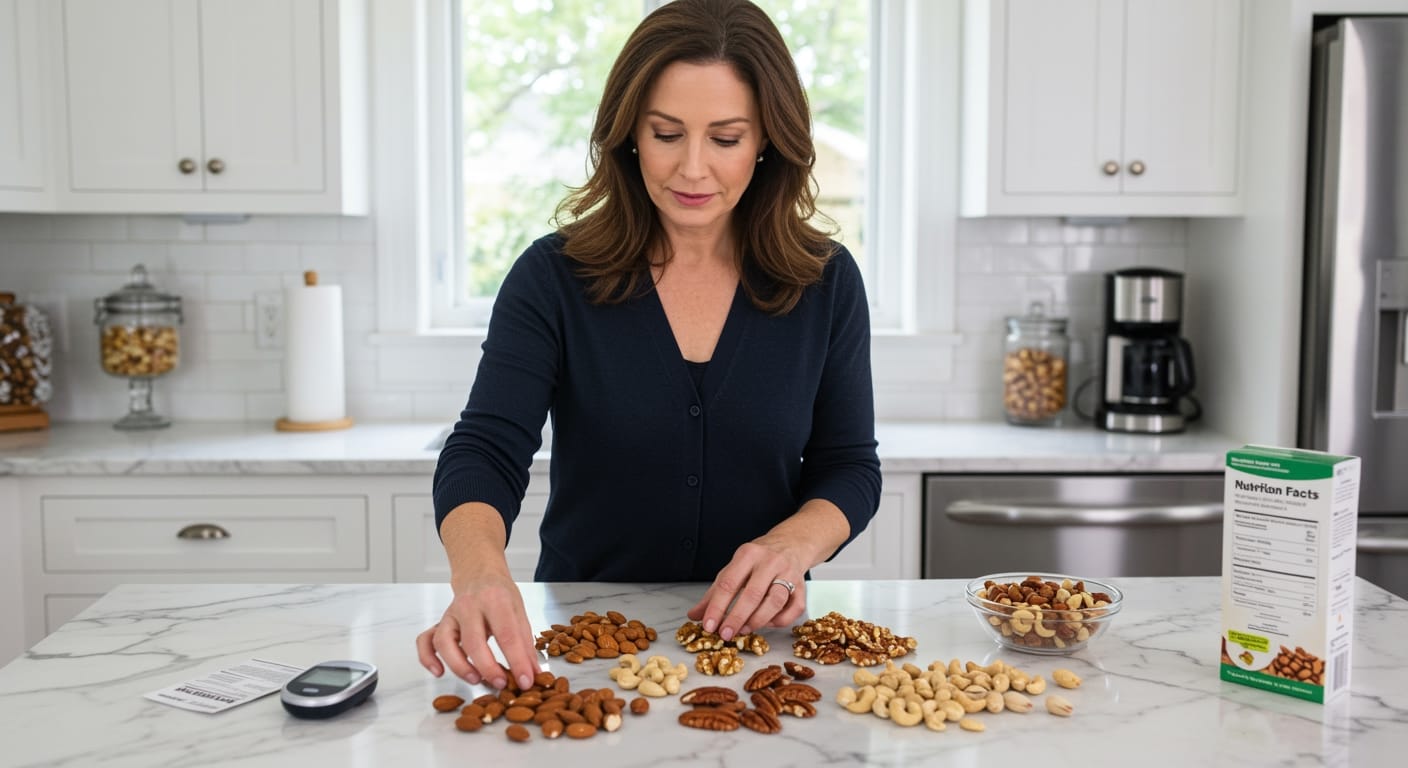✪ Key Takeaway: Nuts are safe for diabetes despite high fat content because they contain healthy fats that improve blood sugar control.
Introduction
You reach for a handful of almonds and then stop.
The voice in your head whispers that nuts are too high in fat for someone with diabetes.
Hi, I’m Abdur, your nutrition coach and today I’m going to explain why this common fear about nuts and diabetes is based on outdated thinking that could actually harm your health.
What Makes Nuts Different From Other High-Fat Foods?
Not all fats are created equal.
Nuts contain monounsaturated and polyunsaturated fats that actually help your body process sugar more effectively.
These healthy fats slow down digestion and prevent blood sugar spikes after meals.
Research shows that people with diabetes who eat nuts regularly have better blood sugar control than those who avoid them.
The Cleveland Clinic reports that nuts can reduce hemoglobin A1C levels by up to 0.07 percent.
✪ Pro Tip: Choose raw or dry-roasted nuts over salted or flavored varieties to avoid added sodium and sugar.
How Do Nuts Actually Affect Blood Sugar Levels?
Nuts have a remarkably low glycemic index despite their calorie density.
Most nuts score between 10-15 on the glycemic index scale, which means they cause minimal blood sugar elevation.
The combination of healthy fats, protein, and fiber in nuts creates a sustained energy release rather than a sugar spike.
Studies published in the Journal of the American Medical Association show that eating nuts with high-carb foods actually reduces the overall glycemic response of the meal.
This means adding nuts to your breakfast cereal or afternoon snack can help stabilize blood sugar throughout the day.
The magnesium in nuts also plays a crucial role in glucose metabolism and insulin sensitivity.
✪ Fun Fact: Almonds can reduce post-meal blood sugar spikes by up to 30 percent when eaten with white bread.
Which Nuts Are Best for People With Diabetes?
All nuts offer benefits, but some stand out for diabetes management.
Almonds top the list with their high vitamin E content and proven ability to improve insulin sensitivity.
Walnuts provide omega-3 fatty acids that reduce inflammation and support heart health, which is crucial for people with diabetes.
Pistachios contain the highest amount of potassium among nuts, helping to regulate blood pressure.
Pecans offer antioxidants that protect against diabetic complications, while cashews provide zinc for immune function.
Research indicates that eating just one ounce of mixed nuts daily can reduce diabetes risk by 27 percent in healthy individuals.
✪ Note: Avoid nuts with added sugars, honey coatings, or excessive salt that can counteract their health benefits.
How Much Is Too Much When It Comes to Nuts?
Portion control matters more than avoiding nuts entirely.
One ounce of nuts contains about 160-200 calories, which fits perfectly into most diabetes meal plans.
This equals roughly 23 almonds, 14 walnut halves, or 18 cashews.
The American Diabetes Association recommends up to five servings of nuts per week as part of a balanced diet.
Eating nuts in measured portions prevents overconsumption while maximizing their blood sugar benefits.
Many people find success by pre-portioning nuts into small containers or bags to avoid mindless snacking.
The key is treating nuts as a nutritious addition to your diet rather than a free-for-all snack food.
✪ Pro Tip: Keep a small measuring cup in your nut container to ensure consistent portion sizes every time.
The Bottom Line
Nuts are not only safe for people with diabetes but actively beneficial for blood sugar control despite their high fat content.
As I always tell my clients, fear the sugar, not the healthy fat.
What questions do you have about incorporating nuts into your diabetes management plan, and which nuts have you found most helpful for your blood sugar goals?
References
At NutritionCrown, we use quality and credible sources to ensure our content is accurate and trustworthy. Below are the sources referenced in creating this article:
- Cleveland Clinic: A Diet Tip for People with Type 2 Diabetes: Eat More Nuts
- PMC: Tree nuts and peanuts as components of a healthy diet
- JAMA Network: Effects of a Mediterranean-Style Diet on Cardiovascular Risk Factors
- American Diabetes Association: Fats





